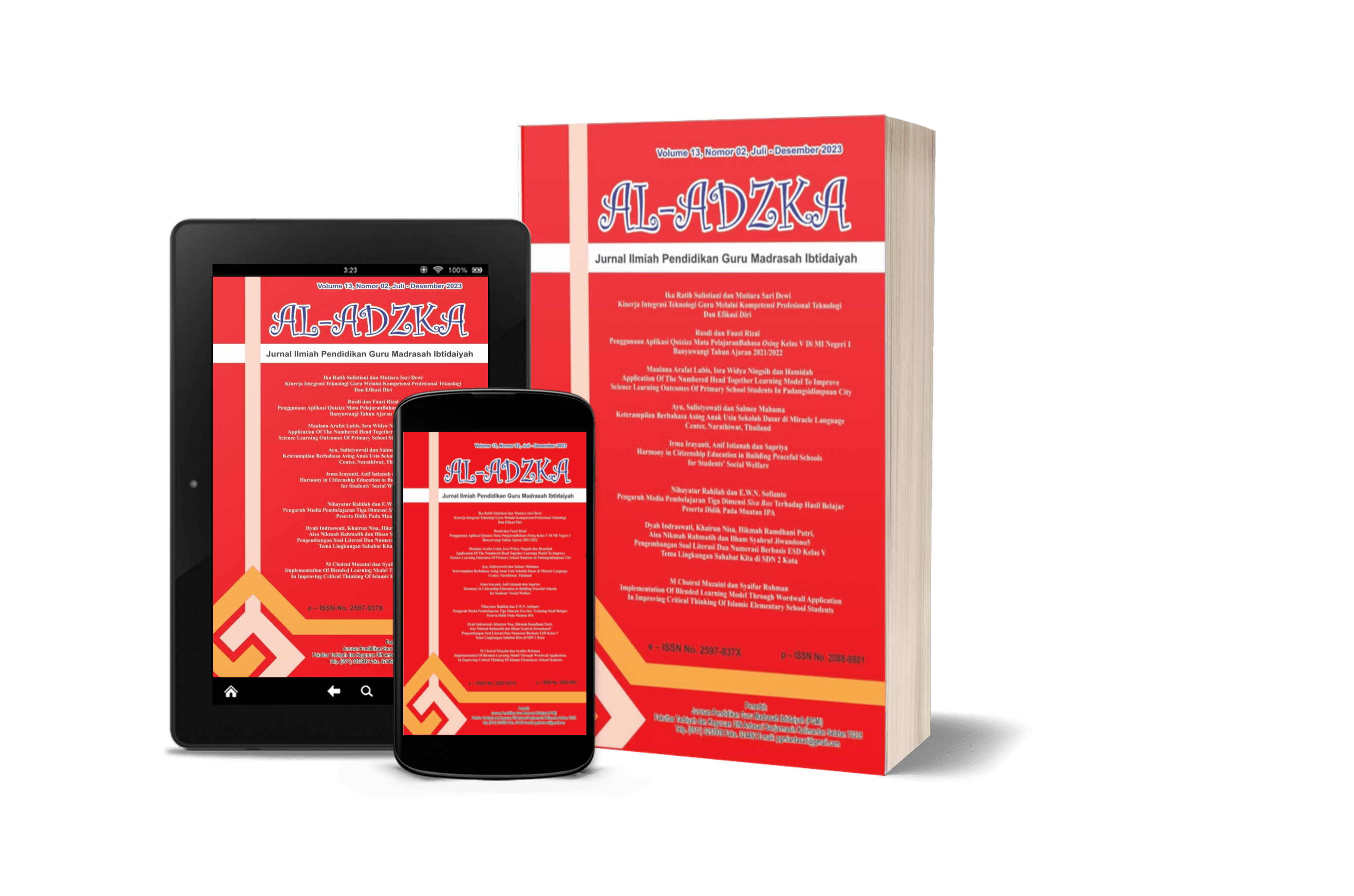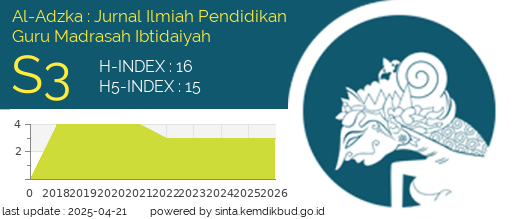The Profile of State Islamic Primary School Teacher Education in Palangka Raya
DOI:
https://doi.org/10.18592/aladzkapgmi.v11i1.4438Abstract
Teacher is a professional position or profession. As a teacher, one of the competencies needed is professional competence. This study aims to look at the profile or educational background of MI teachers in the city of Palangka Raya. This research is important for the PGMI Study Program because it is the initial data for mapping the educational background of teachers in MIN Palangka Raya so that it can be the initial basis for collaboration between the Ministry of Religion of Central Kalimantan Province and PGMI Study Program related to increasing qualifications or procurement of educators in MIN Palangka Raya. This study uses a qualitative approach with data collection techniques through interviews with the head of the state Islamic madrasah in Palangka Raya. The results obtained are that the latest education is appropriate with the work as a class teacher obtained a percentage of 36.36% of class teachers with educational backgrounds or the latest bachelor's degree in Islamic primary school or elementary school teacher education.References
Fitria, Y. (2014). Refleksi Pemetaan Pemahaman Calon Guru SD Tentang Integrated Sains Learning. Pedagogi, XIV(2), 82–87. https://doi.org/10.1534/genetics.109.107474
Kapahang, J. O., Kojo, C., & Uhing, Y. (2014). Pendidikan, Pengalaman Kerja dan Kompetensi Pengaruhnya Terhadap Kinerja Karyawan Pada PT PLN (Persero) Wilayah Suluttenggo. EMBA, 2(No. 4), 503–513.
Kementrian Pendidikan dan Kebudayaan. (2015). Rencana Strategis Kementrian Pendidikan dan Kebudayaan 2015-2019. Jakarta.
Kementrian Pendidikan Nasional. Undang-Undang No. 14 Tahun 2005 Tentang Guru dan Dosen.
Laelasari. (2013). Upaya Menjadi Guru Yang Profesional. Edunomic, Jurnal Ilmiah Pend. Ekonomi, Volume 1 N, 152–159.
Malik, A. (2016). Evaluasi Implementasi Kurikulum 2013 Pada Mata Pelajaran Ilmu Pengetahuan Alam (IPA) di Sekolah Menengah Pertama (SMP) (Studi Kasus di SMPN 2 Cileunyi - Bandung). Retrieved from http://digilib.uinsgd.ac.id/10967/1/1. Laporan Penelitian-Adam Malik.pdf
Muhaimin, Sufiah, & Prabowo, S. L. (2015). Manajemen Pendidikan Aplikasinya dalam Penyusunan Rencana Pengembangan Sekolah/Madrasah (Cetakan ke). Jakarta: Kencana.
Naim, N. (2009). Menjadi Guru Inspiratif: Memberdayakan dan Mengubah Jalan Hidup Siswa. Yogyakarta: Pustaka Pelajar.
Peraturan Pemerintah Republik Indonesia Nomor 19 Tahun 2005 Tentang Standar Nasional Pendidikan. , Pub. L. No. PP No. 19 Tahun 2005 Tentang Standar Nasional Pendidikan, Sekretariat Negara RI 1 (2005).
Putri, A. D. K., & Imaniyati, N. (2017). Pengembangan Profesi Guru Dalam Meningkatkan Kinerja Guru (Professional development of teachers in improving the performance of teacher). Jurnal Pendidikan Manajemen Perkantoran, Vol. 2 No., 93–101.
Triwiyanto, T., Kusumaningrum, D. E., & Gunawan, I. (2017). Proyeksi Ketersediaan, Kebutuhan dan Distribusi Guru Sekolah Menengah Pertama Kota Batu. Malang.
Undang-Undang Nomor 20 Tahun 2003 Tentang Sistem Pendidikan Nasional. , Pub. L. No. UU Nomor 20 Tahun 2003, Sekretariat Negara RI (2003).
Wardani, I. G. A. K. (2012). Mengembangkan Profesionalisme Pendidik Guru Kajian Konseptual dan Operasional. Jurnal Pendidikan, Volume 13, 32–44.
Warsono. (2017). Guru : Antara Pendidik, Profesi dan Aktor Sosial. The Journal of Society & Media, Vol. 1(1).
Yamin, M. (2006). Sertifikasi Profesi Keguruan di Indonesia. Jakarta: Gaung Persada Press.
Downloads
Published
How to Cite
Issue
Section
License
Authors who publish with this journal agree to the following terms:
- Authors retain copyright and grant the journal right of first publication with the work simultaneously licensed under a Creative Commons Attribution 4.0 International that allows others to share the work with an acknowledgement of the work's authorship and initial publication in this journal.
- Authors are able to enter into separate, additional contractual arrangements for the non-exclusive distribution of the journal's published version of the work (e.g., post it to an institutional repository or publish it in a book), with an acknowledgement of its initial publication in this journal.
- Authors are permitted and encouraged to post their work online (e.g., in institutional repositories or on their website) prior to and during the submission process, as it can lead to productive exchanges, as well as earlier and greater citation of published work.












